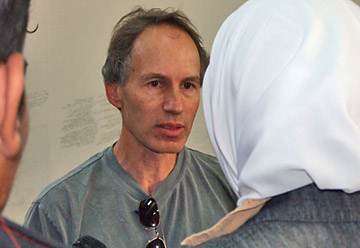Marking May as the “Short Story Month,” Words Without Borders highlights some of its stellar past publications, the Dagestani-Russian novelist Alisa Ganieva’s bitterly comic “A Village Feast” among them.

Tony Eprile (fiction writer, novelist; South Africa/USA) is the author of Temporary Sojourner and Other South African Stories (1989) and The Persistence of Memory (2004), both of which were New York Times Notable Books of the Year. Eprile has taught at Northwestern University, Williams College, Bennington College, Lesley University, and at the Iowa Writers' Workshop.
IWP: What or whom do you read to recharge your writerly batteries? What personal characteristic do you care most about in your life as a writer?
TE: I’m an avid reader of everything from cookbooks to mysteries—in fact, I find it very hard to fall asleep unless I read something. Right now, I’m reading James Preston’s The Wild Trees, a nonfiction narrative about a group of adventurous biologists who discovered an entire ecosystem in the canopies of the coastal redwoods of Northern California, the world’s tallest trees. There are epiphytes, ferns, even frogs living thirty stories above ground, Nature’s own penthouse party in what people used to think was a lifeless space. It’s a reminder that there is always something to be discovered if you’re willing to look.
This brings me to the next question—about the most important personal characteristic for any writer. I think that is an ability to observe, to pay attention to the world around us, and to recognize that different people see the world very differently. I love to take walks with friends who are visual artists, since they notice things I simply miss: the way oak trees fracture light, or the different colors at the edge of mountain ridges at twilight. Having grown up with the desire to be a naturalist, I often find myself pointing out the animals that they don’t see: the frogs with half-submerged lower bodies dangling like Michael Phelps after a race, the coyotes that have been coursing the ridgeline as we stroll below.
IWP: What literary neighborhood excites you especially at the present moment?
TE: I have definitely been excited by the growth in the number of young South African writers, and by the country’s increased interest in them. There seems to be a literary festival every other day, often coinciding with food and wine fests…and why not? Writers should eat and drink well too. My former student and friend Ben Williams edits an excellent website http://book.co.za/ that has all the latest news, reviews, and pictures. Among the writers worth watching/reading are Damon Galgut, Niq Mhlongo, Ben Oswest (Ben Williams’ pseudonym), Rustum Kozain, Ceridwen Dovey,Sihle Khumalo (whose Dark Continent, My Black Arse has to win the award for best title) and Troy Blacklaws. There are plenty of others, but it’s hard for me to get their books here in the States. (South African publishers take note; I’ll happily review books if you send them to me.)
IWP: What—if anything—has given you a cause for political optimism in the last decade?
TE: Perhaps it’s a cliché (and clichés do exist for a reason), but it’s meeting young people around the world. I think of the wonderful Syrian university students who were eager to discuss American literature, bravely read their own poems, and were remarkably open about their political views during the Mid-East reading tour I went on last year. (And I apologize to the student who wanted to sit down and discuss “The Scarlet Letter” that there just wasn’t time to do so.) In Mozambique, I met teenagers who are generous, cheerful and kind with strangers, and filled with hope and ingenuity; I really didn’t mind you laughing so hard at my pathetic goal-keeping in that soccer game. My thirteen-year-old and his friends are astonishingly aware of the world’s ills and willing to do something about it, their bar mitzvah projects ranging from helping educate people about ways to improve our local town’s energy consumption to reading 53 books in three months to raise money to purchase a computerized Braille translator for a blind student. The greatest change I see in this generation is in the awareness of race and racial tolerance. I recall my college poetry teacher, Robert Hayden, telling me of how, on a visit in the mid-1960s as an award-winning poet, he had difficulty finding a hotel in Washington, DC, that would admit someone with his skin color. And now we have seen the most important building in that city occupied by an African-American.
Find Us Online